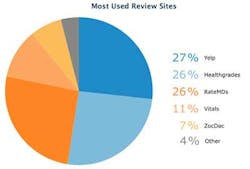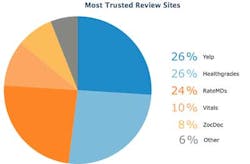It should come as no surprise that the number of people going online for their information continues to increase, and this includes people who go online to find a new dentist. A consistent source of guidance for patients is online reviews.
Dentists receive a lot of information regarding their online presence from many different sources. They should take it all into consideration and decide how new research and statistics apply to them, and how they can best use the information in their practices and with their patients.
Here are some research results that dentists should find interesting. Conducted by Software Advice, a dental practice management systems review group, the results found:
• The number of patients using online reviews jumped 68% from 2013 to 2014
• Nearly half of respondents would go out-of-network for a doctor that has more favorable reviews
• Yelp is the most popular online review site at 27%, and it ties with HealthGrades for most trusted.
The number willing to go out of network is a significant change from 2013, when just 26% of respondents said they would be willing to go out-of-network because of favorable reviews.
As Dr. David Hanauer conducted a similar survey at the University of Michigan in 2012. The folks at Software Advice reached out to him for his response about online reviews. “In many ways, the longer reviews remain on reviews sites and the more people leave them, the more ‘valuable’ they become as an information asset," he said.
How can dentists use this information to help their practices? By making it a priority to ask patients for online reviews. Think about it. These results show that almost 50% of patients would be willing to leave their network in order to go to a doctor that has lots of favorable online reviews, so those reviews need to be out there!
According to the Software Advice report, "A common concern among physicians is exposing themselves to scrutiny or negative reviews online. According to Dr. Hanauer, 'The concern is that the negative reviews are probably disproportionate to the number of negative experiences patients have. Yet, when asked what kind of review they typically write about their doctor, patients’ responses were quite different than what one might expect: 43% of respondents say they usually write something positive, while another 28% say their responses tend to be neutral.'"
Why do patients take the time to write reviews? The top reason is to help other patients, followed by the desire to post their positive or negative experience, and finally, they want to help the doctor or team improve.
To find the data in this report, Software Advice surveyed a sample of 4,620 patients in the United States, collecting a minimum of 365 responses for each question. Read the complete report here.









